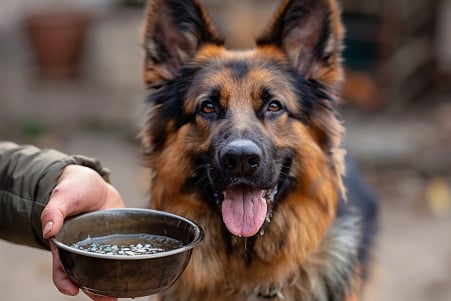Why Is My 8 Week Old Puppy Breathing Fast While Sleeping? Causes and Concerns
9 May 2024 • Updated 9 May 2024

If you've noticed your 8 week old puppy breathing rapidly while napping, this can often be normal for young dogs but may signal an underlying health issue in some cases. Rapid breathing in puppies during sleep can be caused by dreaming, overheating, being overly tired, or potentially illness like respiratory infections or heart problems - careful monitoring of additional symptoms is advised.
With input from veterinary experts and research studies, we'll examine the most common reasons puppies breathe fast while sleeping. This includes investigating normal puppy sleep patterns and breathing rates, to help guide when fast breathing should raise concerns versus being within the expected range. By the end, you'll know when rapid respiration is typical puppy behavior or requires a vet visit.
Why is my 8 week old puppy breathing fast while sleeping?
Why Is My 8-Week-Old Puppy Breathing Fast While Sleeping?
According to research cited by TryFi, the average resting respiratory rate for puppies is 15-40 breaths per minute, with the higher end of that range being especially common during the REM stage of sleep, when dreams occur.
One of the most common reasons for fast puppy breathing while sleeping is the increased brain activity that comes with dreaming. As Rover explains, the rapid eye movement and twitching that occur during dreams can lead to faster breathing.
Another common cause of fast breathing is the physical exertion that happens before sleep, which the puppy's body is still working to recover from and cool down. Even after exercise, the metabolic rate remains elevated for a period, which requires faster breathing.
Environmental factors, such as warm temperatures or poor ventilation, can also lead to fast breathing, as puppies pant to cool themselves down. Meanwhile, psychological stress caused by separation, loud noises, or new environments can also lead to faster breathing.
Dehydration can also impact a puppy's breathing rate by reducing the flow of oxygen in the blood and making breathing more difficult. While these causes are generally nothing to worry about in puppies, it's still important to keep an eye on their breathing, as well as their overall health and energy levels. If fast breathing persists and is accompanied by lethargy or other symptoms, it's time to see the vet.
Potential Medical Issues That Cause Rapid Breathing in Puppies
In addition to the above causes, rapid breathing in puppies can be a sign of medical issues that need to be addressed by a vet right away. Puppies with respiratory infections, like kennel cough or pneumonia, may breathe rapidly due to inflammation and the inability to breathe properly, as Vet Help Direct pointed out.
Puppies with heart problems, such as congenital defects or arrhythmias, may breathe rapidly as the body's way of compensating for a lack of oxygen, according to the VCA Animal Hospitals. Anemia or a low red blood cell count can also cause rapid breathing as the body's way of trying to take in more oxygen.
Congenital abnormalities, such as a diaphragmatic hernia or tracheal malformations, can directly impact a puppy's breathing and cause rapid respiration. VCA Animal Hospitals also said that allergies or environmental irritants can cause respiratory distress and rapid breathing in puppies with sensitive airways or asthma.
It's important to monitor a puppy's breathing and other symptoms closely to help determine if rapid breathing is a sign of a medical issue that needs to be addressed by a vet.
How to Tell If Your Puppy Is in Respiratory Distress
According to Newtown Vets, if your dog is breathing more than 40 times per minute while at rest or sleeping, they are in respiratory distress and need to see a vet. Labored or open-mouthed breathing, wheezing, or gasping can indicate severe respiratory distress and even oxygen deprivation, according to the Animal Hospital of Clemmons.
Changes in the color of your dog's gums or tongue, such as a bluish hue, can indicate low blood oxygen levels, according to PetMD. Lethargy, weakness, or refusal to move can be signs of respiratory distress and should be considered a medical emergency, according to Dr. Buzby's ToeGrips for Dogs.
Other symptoms like drooling, coughing, or nasal discharge can be present if your dog is breathing heavily and may indicate an underlying respiratory problem, according to the Animal Hospital of Clemmons. If your puppy is showing any of these symptoms, it’s important to get them to the vet right away. Respiratory distress can be life-threatening and can worsen quickly.
First Aid and Emergency Care for Puppy Breathing Issues
If a puppy is having trouble breathing or is experiencing respiratory distress, it is important to get emergency veterinary care right away. While the American Veterinary Medical Association notes that first aid care is not a substitute for veterinary treatment, it may help keep your pet alive until you can get them to the vet.
On the way to the vet, make sure the puppy is in a cool, quiet area and check for any visible obstructions in the mouth or throat. FirstVet explains that you can check your pet's mouth for signs of foreign body obstruction and if you find something, you can gently remove it with your hands to help the animal breathe. If the obstruction is in the airway, you can perform the Heimlich maneuver to help dislodge the foreign body.
It's important to stay calm and avoid hugging or putting your face near the puppy, as they may become unpredictable due to fear or pain, as noted by the American Veterinary Medical Association. Make sure to give the veterinary team as much information as possible about the puppy's symptoms, when they started, and any potential exposures or underlying conditions.
How to Prevent and Manage Respiratory Problems in Puppies
Veterinary professionals have several recommendations for preventing and managing respiratory problems in puppies. One of the most important is to make sure that puppies are current on all of their vaccinations, including those that protect against respiratory infections like kennel cough, according to the Animal Medical Center. In addition, puppies should be kept away from places where they may be exposed to respiratory pathogens, such as dog parks and boarding facilities.
Keeping up with dental care, including regular teeth brushing and professional cleanings, is also important, as VCA Animal Hospitals explains that this can help prevent respiratory infections. It's also important to make sure that puppies have a safe, comfortable environment that minimizes stress and anxiety and, in turn, respiratory distress.
Finally, it's important to keep an eye on puppies' breathing and overall health and to get them to the vet if any issues arise. Catching and treating problems early can help prevent more serious respiratory issues from developing. These steps can help ensure that puppies' respiratory health is supported.
Conclusion: How to Keep Your Puppy's Respiratory System Healthy
While rapid breathing in 8-week-old puppies is normal, it's important to know the potential causes and when to take your puppy to the vet. It's important to keep an eye on your puppy's breathing, as well as other symptoms and behaviors, so you can catch any potential health issues early. If your puppy is showing signs of respiratory distress, it's important to get them to the vet as soon as possible, as these symptoms can be life-threatening.
Getting your puppy vaccinated, keeping them clean, and making sure they're not stressed are all ways to help prevent respiratory issues in puppies. With the right care, most puppies will grow out of rapid breathing as their respiratory systems develop and go on to live long, healthy lives.


